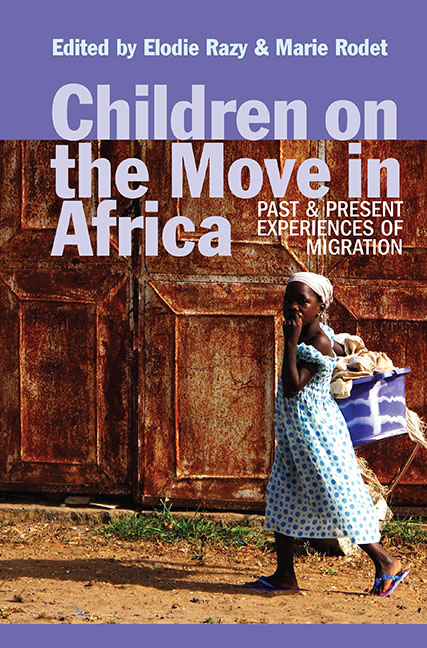Book contents
- Frontmatter
- Contents
- List of Illustrations
- Notes on Contributors
- Preface
- Acknowledgements
- Introduction: Child Migration in Africa: Key Issues & New Perspectives
- Part I CHILD MIGRANTS IN AFRICA: BEYOND THE DILEMMA OF VULNERABILITY v. AGENCY
- Part II BEING A CHILD & BECOMING A GENDERED ADULT: THE CHALLENGES OF MIGRATIONS IN CHILDHOOD
- 3. ‘Bringing a Girl From the Village’: Gender, Child Migration & Domestic Service in Post-colonial Zambia
- 4. ‘I Will Never Become a Crocodile but I am Happy if I Eat Enough’: A Psychological Analysis of Child Fosterage & Resilience in Contemporary Mali
- 5. Working as a ‘Boy’: Labour, Age & Masculinities in Togo, c. 1975–2005
- Part III MOBILITY, IMAGINATION & MAKING NATIONS
- Bibliography
- Index
4. - ‘I Will Never Become a Crocodile but I am Happy if I Eat Enough’: A Psychological Analysis of Child Fosterage & Resilience in Contemporary Mali
from Part II - BEING A CHILD & BECOMING A GENDERED ADULT: THE CHALLENGES OF MIGRATIONS IN CHILDHOOD
Published online by Cambridge University Press: 25 October 2017
- Frontmatter
- Contents
- List of Illustrations
- Notes on Contributors
- Preface
- Acknowledgements
- Introduction: Child Migration in Africa: Key Issues & New Perspectives
- Part I CHILD MIGRANTS IN AFRICA: BEYOND THE DILEMMA OF VULNERABILITY v. AGENCY
- Part II BEING A CHILD & BECOMING A GENDERED ADULT: THE CHALLENGES OF MIGRATIONS IN CHILDHOOD
- 3. ‘Bringing a Girl From the Village’: Gender, Child Migration & Domestic Service in Post-colonial Zambia
- 4. ‘I Will Never Become a Crocodile but I am Happy if I Eat Enough’: A Psychological Analysis of Child Fosterage & Resilience in Contemporary Mali
- 5. Working as a ‘Boy’: Labour, Age & Masculinities in Togo, c. 1975–2005
- Part III MOBILITY, IMAGINATION & MAKING NATIONS
- Bibliography
- Index
Summary
Child migration, whether internal or international, constitutes a long-standing tradition in Sub-Saharan Africa. However, as Rodet and Razy highlight in the Introduction to this volume, the experiences of migrant African children still remain inadequately studied and the boundaries between the different forms and shapes of their experiences are quite unclear. This chapter aims to give an overview of what these authors define as the ‘fluidity and flexibility of the child migrant's status’ through a psychological exploration of the phenomenon of fosterage, one of the most widespread pathways of child migration in Africa.
In particular, while most of the chapters of this volume adopt a historical perspective on children's migration by analysing sources from the past, this contribution describes contemporary patterns of child mobility as observed through the eyes of two fostered young people. Their living narratives show some common points with the collective values and historical roots of fosterage collected through the discourses of community leaders. Yet they also demonstrate the creative and idiosyncratic survival strategies adopted by these children to overcome the adversities related to their fosterage experience.
The term ‘fosterage’ (or confiage) refers to a set of common practices in ‘shared management child care societies’, where child-rearing tasks are distributed between several community members, rather than being considered the exclusive responsibility of the biological parents. As a consequence, children are easily entrusted to external guardians to be nourished, educated or initiated into religious or professional training. Due to the widespread nature of these child-rearing strategies, African children are likely to develop multiple attachment ties as they can rely on a wide network of caregivers. As Silk highlights, ‘the normative pattern of fosterage transactions itself appears to reduce the probability that children will receive poor treatment in their foster households’.
This hypothesis contrasts with dominant perceptions in the West, which cast children's displacement or residential mobility as a risk factor or a source of psychological instability for young people. In addition to the influence of these psychological approaches, an ethnocentric bias seems to affect research on African child migration and fosterage. This situation is partly due to the twentieth-century shift in the colonial approach to children ‘from one of repression to one of assistance’.
- Type
- Chapter
- Information
- Children on the Move in AfricaPast and Present Experiences of Migration, pp. 85 - 103Publisher: Boydell & BrewerPrint publication year: 2016

